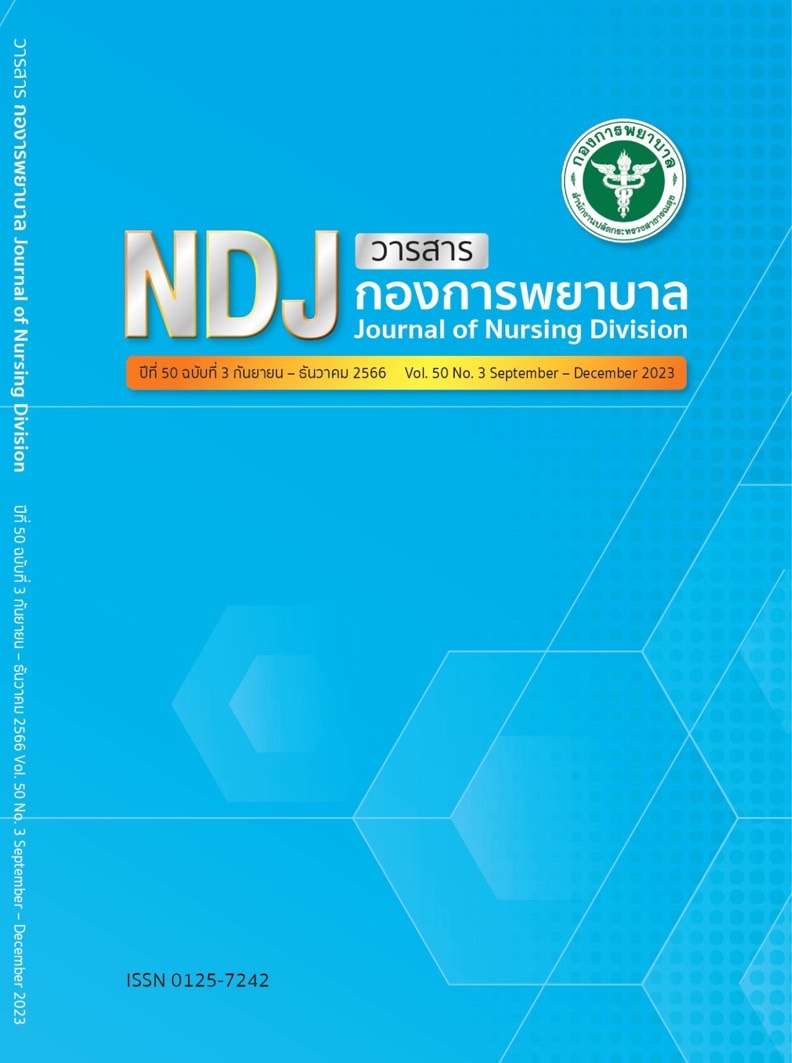ผลของโปรแกรมส่งเสริมสมรรถนะแห่งตนในสตรีหลังคลอดที่เป็นเบาหวานขณะตั้งครรภ์และการสนับสนุนของครอบครัวต่อความรู้ พฤติกรรมการดูแลตนเอง และระดับน้ำตาลในเลือด โรงพยาบาลนครปฐม
Main Article Content
บทคัดย่อ
บทคัดย่อ
การวิจัยกึ่งทดลองนี้ มีวัตถุประสงค์เพื่อศึกษาผลของโปรแกรมส่งเสริมการรับรู้สมรรถนะแห่งตนและการสนับสนุนของครอบครัวต่อความรู้ พฤติกรรมการดูแลตนเองด้านอาหารและการออกกำลังกาย และระดับน้ำตาลในเลือด กลุ่มตัวอย่าง คือ สตรีหลังคลอดที่เป็นเบาหวานขณะตั้งครรภ์ แบ่งเป็น 2 กลุ่มๆ ละ 33 คน กลุ่มทดลองเข้าร่วมกิจกรรมส่งเสริมการรับรู้สมรรถนะแห่งตนและการสนับสนุนของครอบครัว จำนวน 5 ครั้ง ระยะเวลา 6 สัปดาห์ กลุ่มควบคุมได้รับคำแนะนำตามปกติ เครื่องมือที่ใช้ในการวิจัย คือ โปรแกรมส่งเสริมสมรรถนะแห่งตนในสตรีหลังคลอดที่เป็นเบาหวานขณะตั้งครรภ์และการสนับสนุนของครอบครัว เครื่องมือเก็บรวบรวมข้อมูล ได้แก่ แบบสอบถามข้อมูลส่วนบุคคล แบบวัดความรู้ พฤติกรรมการดูแลตนเองด้านอาหารและการออกกำลังกาย และแบบบันทึกระดับน้ำตาลในเลือด ค่าความตรงตามเนื้อหา 0.94 ค่าความเที่ยง 0.85 วิเคราะห์ข้อมูลด้วยความถี่ ร้อยละ ค่าเฉลี่ย ส่วนเบี่ยงเบนมาตรฐาน Independent t-test และ Paired Samples t-test
ผลการศึกษา พบว่า หลังการทดลอง กลุ่มทดลองมีคะแนนเฉลี่ยความรู้ สูงกว่าก่อนการทดลอง และสูงกว่ากลุ่มควบคุมอย่างมีนัยสำคัญทางสถิติ (p < .001) และมีพฤติกรรมการดูแลตนเองด้านอาหาร และการออกกำลังกาย สูงกว่ากลุ่มควบคุมอย่างมีนัยสำคัญทางสถิติ (p < .001) การเปรียบเทียบระดับน้ำตาลในเลือดขณะอดอาหารในกลุ่มทดลอง ก่อนและหลังการทดลอง พบว่า ไม่มีความแตกต่างกันทางสถิติ (p = 0.952) การเปรียบเทียบระดับน้ำตาลในเลือดขณะอดอาหารระหว่างกลุ่มทดลองและกลุ่มควบคุม พบว่า ไม่มีความแตกต่างกันทางสถิติ (p = 0.764) แต่กลุ่มตัวอย่างในกลุ่มทดลอง และกลุ่มควบคุม มีค่าระดับน้ำตาลในเลือดขณะอดอาหารอยู่ในเกณฑ์ปกติ
Article Details

อนุญาตภายใต้เงื่อนไข Creative Commons Attribution-NonCommercial-NoDerivatives 4.0 International License.
เอกสารอ้างอิง
References
Rowland J, Wilson, CA. The association between gestational diabetes and ASD and ADHD: a
systematic review and meta-analysis. Sci Rep. 2021; 11: 5136 .
Praphat Wanichpongphan, Kuson Rasamecharoen, Triphop Lertbunnapong. Obstetrics textbook. Bangkok: PA. Living: 2017. Thai
Kapoor D, Gupta, Y, Desai A, et al. Lifestyle intervention programme for Indian women with history of gestational diabetes mellitus. Global health epidemiology and genomics. 2019; 4: e1.
Vounzoulaki E, Khunti K, Abner SC, et al. Progression to type 2 diabetes in women with a known
history of gestational diabetes: systematic review and meta-analysis. BMJ. 2020; 369(1): m1361.
Diabetes Association of Thailand. Clinical Practice Guideline for Diabetes 2017. Bangkok: Arun
Printing: 2017. Thai.
Xie W, Wang Y, Xiao S, et al. Association of gestational diabetes mellitus with overall and type
specific cardiovascular and cerebrovascular diseases: systematic review and meta-analysis. BMJ.
; 378 : e0702442022.
Walailak Suwanpakdee, Sunanta Youngwanichsetha, Sopen Shunuan. Effectsof a Self-Efficacy Enhancement Program on Dietary and Exercise Behaviors among Pregnant Women with Gestational Diabetes Mellitus. SCNG; 6(1): 39-50. Thai.
Huang S, Magny-Normilus C, McMahon E, Whittemore R. Systematic Review of Lifestyle Interventions for Gestational Diabetes Mellitus in Pregnancy and the Postpartum Period. JOGNN. 2022; 51: 155-25.
Yang Y, Lin QY, Quan PP, Wen YM, Li XY, Lin JF. Study on the Effect of Web Based Real-Time Interactive Intervention Teaching Model on Self-Efficacy of Gestational Diabetes Mellitus Patients. International Journal of Clinical Medicine. 2020; 11: 778-85.
Gilinsky AS, Kirk AF, Hughes AR, Lindsay RS. Lifestyle interventions for type 2 diabetes prevention in women with prior gestational diabetes: A systematic review and meta-analysis of behavioural, anthropometric and metabolic outcomes. Prev Med Rep. 2015; 24(2): 448-61.
Berger AA, Peragallo-Urrutia R, Nicholson WK. Systematic review of the effect of individual and combined nutrition and exercise interventions on weight, adiposity and metabolic outcomes after delivery: evidence for developing behavioral guidelines for post-partum weight control. Pregnancy Childbirth. 2014; 14(1): 319.
Aroda VR, Christophi CA, Edelstein SL, et al. The effect of lifestyle intervention and metformin on preventing or delaying diabetes among women with and without gestational diabetes: the Diabetes Prevention Program outcomes study 10-year follow-up. J Clin Endocrinol Metab. 2015; 100(4): 1646–53.
Nielsen KK, Kapur A, Damm P, Courten M, Bygbjerg C. From screening to postpartum follow-up – the determinants and barriers for gestational diabetes mellitus services: a systematic review. Pregnancy Childbirth. 2014; 14: 41.
Bandura A. Self-efficacy the Exercise of Control. New York: W.H. Freeman: 2014.
Supreya Tansakul. (2005). Theory and model applied in health education and behavioral science (Revised edition). Bangkok: Yutharin Printing. Thai.
Sunantha Yangwanichset, Sasithorn Phumduang, Thitiporn Inkhathawornwong. Effects of the
exercise program Effects of Tai Chi exercise on controlling blood sugar levels Blood and health
status of postpartum women with a history of type 2 diabetes. [The funding research report].
Songkla: Prince of Songkla University; 2013. Thai.
Ansarzadeh S, Salehi L, Mahmoodi Z, Mohammadbeigi A. Factors affecting the quality of life in
women with gestational diabetes mellitus: a path analysis model. Health and Quality of Life Outcomes. 2020; 8:31.
Al-Hashmi I, Hodge F, Nandy K, Thomas E, Brecht ML. The Effect of a Self-Efficacy-Enhancing Intervention on Perceived Self-Efficacy and Actual Adherence to Healthy Behaviours Among Women with Gestational Diabetes Mellitus. Sultan Qaboos Univ Med J. 2018; 18(4): e513-19.
Cheung NW, Blumenthal C, Smith BJ, et al. A Pilot Randomised Controlled Trial of a Text Messaging Intervention with Customisation Using Linked Data from Wireless Wearable Activity Monitors to Improve Risk Factors Following Gestational Diabetes. Nutrients. 2019; 11(3): 590.
Aunchalee Jittrapirom, Jantararat Chareonsanti. Effectiveness of Education Provision and Relaxation Training Program on Self-care Behaviors, Blood Sugar Levels, and Stress among Gestational Diabetic Women. Nursing Journal. 2015; 42: 133-45. Thai.
Kwak SH., Choi SH, Kim K, Jung SH, et al. Prediction of type 2 diabetes in women with a history of gestational diabetes using a genetic risk score. Diabetologia. 2013; 56: 2556–63.
Cunningham GF, Leveno JK., Bloom LS, Hauth, CJ., Rouse JD, Spong YC. Williams obstetrics (24th ed.). New York: Mcgraw-Hill; 2014.
O’Reilly SL, Dunbar JA, Versace V, et al. Mothers after Gestational Diabetes in Australia (MAGDA): A Randomised Controlled Trial of a Postnatal Diabetes Prevention Program. PLoS Med. 2016; 13(7): e1002092
Li N, Liu J, Zhang C, et al. Effects of lifestyle intervention during pregnancy on postpartum diabetes among Chinese women with gestational diabetes. Diabetologia. 2021; 64(1): 255-58.
Tandon N, Gupta Y, Kapoor D, et al. (2022). Effects of a Lifestyle Intervention to Prevent
Deterioration in Glycemic Status Among South Asian Women With Recent Gestational Diabetes: A
Randomized Clinical Trial. JAMA Netw Open; 5(3): e220773.


